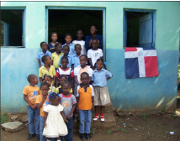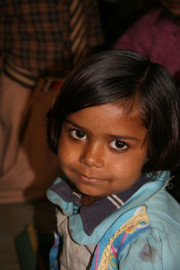
Dominican Republic (MNN) — The island of Hispaniola is one of contrasts. On one side, there's Haiti: the poorest country in the Western Hemisphere. On the other side, there's the Dominican Republic. "There's a tremendous amount of wealth that is being developed in the country, but it's primarily being developed in Santo Domingo and in the tourist areas," says Scott Vanderkooy of Worldwide Christian Schools.
According to the latest official poverty data, more than a third of the Dominican Republic's total population lives in poverty. Of those who are poor, nearly a fifth are living in extreme poverty, and they're usually in the rural areas of the DR.
For more than 70 years, Haitian immigrants have crossed the border to work the sugar cane harvest. However, Vanderkooy says, "The sugar cane industry in the DR is really dying. It's no longer competitive, but many Haitians have stayed in these bateys, living under deplorable conditions."
A batey is a community where workers are housed. They're unique in culture and language in their mix of Haitian and Dominican. But the biggest problem is: they're overpopulated and under-resourced. An estimated 250,000 residents live in approximately 500 bateys throughout the Dominican Republic.
The government considers the sugar cane industry responsible for the workers' welfare, so they provide next to no public services. As a result, the bateys are often in deplorable shape, many without drinking water, proper sanitation facilities, medical care, or schools.
Since the Haitians who originally filled the bateys were not legal immigrants, their children are citizens of no country because the government considers them "in transit." Without citizenship papers from Haiti, these children of Haitian immigrants cannot go to school, locking them into a cycle of poverty.
As the sugar industry abandoned these communities, the only way to survive was for the bateys to transform themselves into new sorts of communities. That's where Worldwide Christian Schools steps in, first to nurture leadership in the churches. "We found that schools really have a wonderful role in these villages, but it all starts with local leadership", explains Vanderkooy. "If we don't have leaders from that area that can operate these schools, more than likely these schools are not going to be successful."
WCS partners with COCREF (Colegios Christianos Reformados) — an association of Dominican Christian schools that began in 1981. COCREF consists of 21 Christian schools, serving over 5,000 students and employing 250 people within the Dominican Republic. "These schools are very much ‘wraparound' in that they provide academics but also train on the importance of clean water, nutrition, job skills, that type of thing." The change can be felt palpably, when the Gospel gets involved. "In some of these villages, you walk in and you feel the darkness. Voodoo is a very real religion in these bateys. You can feel darkness. But when there's a (WCS) school there, there's a change taking place that's noticeable."
Their ambition: "To provide a quality Christian education to our students through our schools, implementing active and participatory teaching that promotes the development of the God-given gifts, talents, and abilities so that they can transform their lives, those around them, and their nation through being servant leaders." Vanderkooy says this model has proven the most effective over the years, and especially so in the Dominican Republic. "We found, in some cases, that the bateys have advanced to the point where they can sustain their own school, and of course, that's the goal."
However, he's quick to acknowledge that poverty prevents parents from being able to pay for school fees, uniforms, or supplies. The reality is: if a parent is forced to choose between school or food, education falls by the wayside. For that reason, "Hope Rising" came into being. "Hope Rising" is a joint program of Worldwide Christian Schools: U.S., Christian Reformed World Missions, and COCREF that connects one sponsor with one student in the Dominican Republic.
The sponsorship program not only provides an education, says Vanderkooy, but it also helps students have a better understanding of their world, plus they're exposed to Christ. "The reason we're showing this love is because God showed it to us. I think every action that's involved in schools like this is a reflection of God's love, and it can't be separated from it. It's integrated in everything we say or do."
In a way, the contrast provided by the Gospel is yet another example of the wealth development in the Dominican Republic. It's all about hope for the future. Want to help? Click here.

